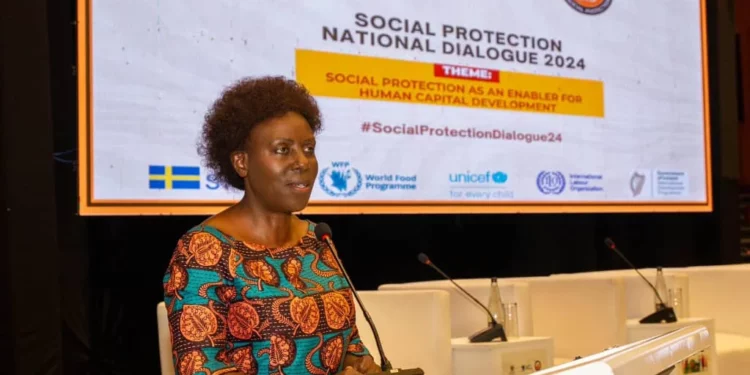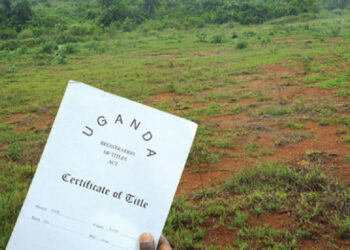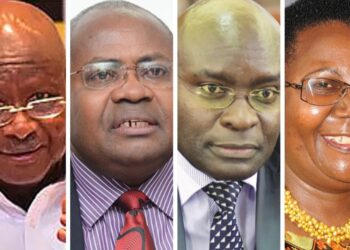In a powerful gathering of stakeholders, the National Social Protection Dialogue 2024, organized by Uganda’s Ministry of Gender, Labour, and Social Development in partnership with development agencies, focused on social protection as a critical pillar for sustainable development.
With the theme “Social Protection as an Enabler for Human Capital Development Across the Lifecycle,” this year’s dialogue highlighted the role of social protection in bolstering Uganda’s workforce and promoting the well-being of citizens from childhood through old age.
Addressing the audience at Serena Hotel Kampala, Flavia Kabahenda Rwabuhoro, Woman MP for Kyegegwa District and Chairperson of the Uganda Parliamentary Forum on Social Protection, passionately advocated for social protection as a fundamental right, not a charitable handout. “Social protection is an investment in our future,” Kabahenda stated. “It’s about ensuring a productive, equitable society rooted in our values and knowledge.” She called on the government to increase funding for social security initiatives like cash grants, which are vital for reducing inequality and promoting economic stability.
Kabahenda also raised concerns over recent Uganda Bureau of Statistics (UBOS) data, which she argued undercounts the elderly population. “Accurate data is essential for planning,” she emphasized. “If we don’t correctly account for our elderly, we are failing them and undermining the entire social protection framework.” She advocated for a National Health Insurance Scheme tailored to the elderly, noting, “Our older citizens require specialized health support, and without proper planning, we cannot meet their unique needs.”
Echoing Kabahenda’s concerns, Arthur Namara Araali, Chairperson of HelpAge, underscored the need for dignified care for Uganda’s elderly. “Every Ugandan deserves to live with dignity, regardless of age,” Namara asserted. He pointed to the Senior Citizens Grant (SAGE) program, which provides a monthly stipend of 25,000 UGX to around 367,000 senior citizens, though he criticized discrepancies in UBOS data, which lists only 80,000 beneficiaries. “These inaccuracies not only create confusion but raise questions about potential ghost beneficiaries. We need transparency to ensure every eligible older person is truly receiving support.”
Dr. Fred Muhumuza, a Senior Development Economist and Director of the Makerere University Business School Economic Forum, expanded the conversation, urging Uganda to adopt a realistic approach to social protection.
“Our youth, children, and elderly all have unique needs,” Muhumuza said. “Addressing healthcare gaps, fostering child resilience, and reducing unemployment are essential for economic growth and social cohesion.” Muhumuza emphasized that inclusive social protection is not only a moral imperative but also a catalyst for economic stability.
Professor Pamela K. Mbabazi, Chairperson of the National Planning Authority (NPA), outlined social protection goals in Uganda’s National Development Plan IV (NDP IV), including reducing SAGE’s eligibility age, expanding social insurance, and rolling out the National Health Insurance Scheme. “Our plans prioritize economic security across generations,” she explained. “These reforms are about creating a productive and healthy society where Ugandans of all ages can thrive.”
SAGE’s Impact on Local Development
Jill Clements, Deputy Head of Mission at the Embassy of Ireland, praised the SAGE program as a cornerstone for local economic growth. “SAGE is not just support; it’s empowerment,” Clements remarked.
“This program has uplifted older persons and their families, fueling local economies and strengthening Uganda’s social fabric.” Clements further highlighted the collaborative approach to Uganda’s social protection framework, a system that involves multiple ministries and local governments. “A united effort is the only way to ensure no Ugandan is left without support,” she emphasized.
The National Social Protection Dialogue 2024 concluded with a resounding call for an inclusive social protection system that fosters resilience, stability, and productivity.
As Uganda’s leaders, academics, and private sector stakeholders came together, they underscored the need for accurate data, comprehensive policies, and joint efforts across sectors. With targeted investments in health, education, and financial security, Uganda can aspire toward a more equitable and inclusive future.
Do you have a story in your community or an opinion to share with us: Email us at editorial@watchdoguganda.com













